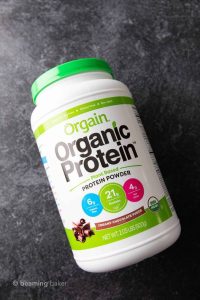
Protein powder is a popular nutritional supplement among athletes and fitness enthusiasts. It’s a convenient way to increase your protein intake, which can be essential for muscle building and repair. However, many protein powders are loaded with added sugar.
This article dives into the world of low-sugar protein powder, helping you find the perfect option to support your fitness goals without compromising on taste or nutrition.
Why Choose Low-Sugar Protein Powder?
Here are some reasons to consider low-sugar protein powder:
-
Reduced Sugar Intake: Many people are looking to cut back on added sugar in their diet. Low-sugar protein powder allows you to enjoy the benefits of protein without a sugar overload.
-
Weight Management: Sugar can add unwanted calories to your diet. Low-sugar protein powder can be a helpful tool for weight management when used as part of a healthy diet and exercise routine.
-
Blood Sugar Control: For people with diabetes or prediabetes, managing blood sugar levels is crucial. Low-sugar protein powder can help avoid spikes in blood sugar that can occur with high-sugar protein powders.
-
Focus on Protein: Low-sugar protein powder allows you to focus on the core benefit of protein powder: protein! You get the muscle-building and repair benefits without unnecessary added sugars.
-
Improved Taste: Many people find low-sugar protein powders to be just as delicious as their high-sugar counterparts. Manufacturers are developing innovative ways to create flavorful protein powders without added sugar.
If you’re looking for a way to boost your protein intake without the added sugar, low-sugar protein powder is a great option to consider.

Understanding Protein Powder Labels
When choosing a low-sugar protein powder, it’s important to understand protein powder labels. Here’s a quick breakdown:
-
Protein Content: This is the most important factor to consider. Look for protein powders with at least 20 grams of protein per serving.
-
Sugar Content: Aim for low-sugar protein powders with 5 grams or less of added sugar per serving. Some may even have zero grams of added sugar!
-
Ingredients: Look for protein powders with high-quality protein sources, such as whey protein, casein protein, or plant-based proteins like pea protein or brown rice protein.
-
Other Nutrients: Some protein powders may also contain other beneficial nutrients, such as vitamins, minerals, or probiotics. Consider your individual needs when choosing a protein powder.
Reading the label carefully will help you choose a low-sugar protein powder that meets your needs and fits your dietary goals.

Popular Types of Low-Sugar Protein Powders
There are many different types of low-sugar protein powders available. Here are a few popular options:
-
Whey Protein Powder: Whey protein is a fast-absorbing protein, making it ideal for post-workout recovery. There are many low-sugar whey protein powders available.
-
Casein Protein Powder: Casein protein is a slow-digesting protein, making it a good option for sustained muscle support. Low-sugar casein protein powders are available as well.
-
Plant-Based Protein Powder: For those who follow a vegan or vegetarian diet, there are many low-sugar plant-based protein powders on the market. These are made from plant sources like pea protein, brown rice protein, or soy protein.
Consider your dietary needs and preferences when choosing the type of low-sugar protein powder that’s right for you.
Finding the Perfect Low-Sugar Protein Powder: Flavor and Mixability
Finding a low-sugar protein powder that tastes good and mixes well is essential for making it a regular part of your routine. Here are some tips:
-
Read Reviews: Look for reviews from other customers who have tried low-sugar protein powders. They can give you insights into taste and mixability.
-
Try Samples: Many protein powder companies offer sample sizes or single-serving packets. This is a great way to try different flavors before committing to a large tub.
-
Consider Flavored vs. Unflavored: There are both flavored and unflavored low-sugar protein powders available. Flavored options can be a good choice if you’re concerned about taste. Unflavored powders offer more versatility and can be blended into smoothies or other recipes.
-
Mix it Up: Experiment with different ways to mix your low-sugar protein powder. Try it with water, milk, almond milk, or even add it to yogurt or oatmeal.
-
Get Creative: If you find an unflavored protein powder you like, but struggle with the taste, get creative! Add fruits, nut butters, or spices to your shakes to create your own delicious and nutritious concoctions.
By following these tips, you can find a low-sugar protein powder that you’ll enjoy incorporating into your routine.
Using Protein Powder Effectively
Here are some tips for using protein powder effectively:
-
Time it Right: The best time to consume protein powder depends on your goals. For muscle building, consume it after your workout. For weight management, it can be used as a meal replacement or snack.
-
Don’t Rely Solely on Protein Powder: Protein powder is a supplement, not a replacement for a healthy diet. Make sure you’re getting enough protein from whole food sources as well.
-
Stay Hydrated: Drinking plenty of water is important when consuming protein powder. This helps with digestion and absorption.
-
Listen to Your Body: Pay attention to how your body reacts to protein powder. If you experience any digestive issues, reduce your intake or consult a healthcare professional.
By using protein powder strategically, you can maximize its benefits and reach your fitness goals.

The Environmental Impact of Protein Powder
While protein powder can be a healthy choice for you, it’s important to consider the environmental impact of your choices. Here are some things to think about:
-
Source of Protein: Where does the protein in your low-sugar protein powder come from? Whey protein often comes from dairy farms, which can have an environmental impact. Plant-based protein powders may have a lower environmental impact.
-
Packaging: Many protein powders come in large plastic tubs. Look for brands that use recyclable packaging or offer refill options.
-
Production Process: The manufacturing process for protein powder can use a lot of energy and resources. Consider brands that prioritize sustainable practices.
By thinking about these factors, you can choose a protein powder that aligns with your values.
Conclusion: Embrace Your Fitness Journey with Low-Sugar Protein Powder
Low-sugar protein powder can be a valuable tool for athletes and fitness enthusiasts looking to increase their protein intake. It provides the muscle-building and repair benefits of protein without the added sugar.
By understanding protein powder labels, choosing the right type for your needs, and incorporating it strategically into your routine, you can make protein powder work for you. Remember, a healthy diet and exercise are essential for overall fitness and well-being.







